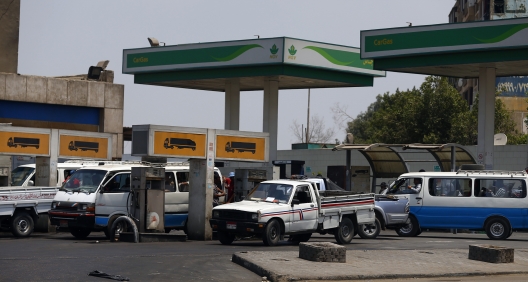 With the formulation and adoption of a new budget last month, Egyptian authorities took the bold step to reduce fuel subsidies in an effort to correct an economy in turmoil after three years of civil unrest. Experts and policy makers have long debated fuel and food subsidies in Egypt, fully aware on an intellectual level of the added economic burden of such an expensive and inefficient system. But a culture of “subsidy entitlement” among the rich and the poor established a norm on which few politicians were willing to spend their capital to change. In their most recent article on EgyptSource, senior fellow Mohsin Khan and assistant director Svetlana Milbert give praise for the courageous move to reform subsidy policy, but note that comprehensive reform requires more from President Abdel Fattah al-Sisi.
With the formulation and adoption of a new budget last month, Egyptian authorities took the bold step to reduce fuel subsidies in an effort to correct an economy in turmoil after three years of civil unrest. Experts and policy makers have long debated fuel and food subsidies in Egypt, fully aware on an intellectual level of the added economic burden of such an expensive and inefficient system. But a culture of “subsidy entitlement” among the rich and the poor established a norm on which few politicians were willing to spend their capital to change. In their most recent article on EgyptSource, senior fellow Mohsin Khan and assistant director Svetlana Milbert give praise for the courageous move to reform subsidy policy, but note that comprehensive reform requires more from President Abdel Fattah al-Sisi.
Source: Isabel Esterman, “Despite austerity, spending in new budget is close to last year’s,” Mada Masr, July 8, 2014.
Khan and Milbert outline the International Monetary Fund’s (IMF) ideal criteria for subsidy reform as including a comprehensive energy sector reform plan, a comprehensive communications campaign to prepare the public, appropriately phased, sequenced, and automatic price increases, and targeted mitigating measures to protect low-income groups. President Sisi surprised the public, taking advantage of his post-election honeymoon period to implement his reform plan and avoid any organized opposition, but if he hopes to maintain his progress and enact future reforms to reduce the country’s deficit, he will need to pay closer attention to communicating his plan to the public.
To learn more, please read Mohsin Khan and Svetlana Milbert’s article, “Finally Some Action on Subsidies in Egypt” on EgyptSource.
Image: Photo: A microbus waits with other vehicles for fuel at a petrol station in Cairo July 6, 2014 (Reuters/Amr Abdallah Dalsh)
